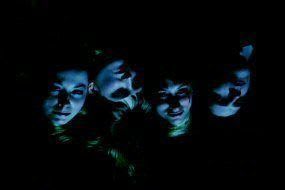Dark Tales
Based on the stories of Hans Christian Andersen
Giant Olive
The Lion and Unicorn Theatre
(2009)
There is every good reason to travel to Kentish Town these days, not least to visit the remarkable theatre space above the Lion and Unicorn. The resident company, Giant Olive, have decided to make this venue its own. Dark Tales, a selection of famous and not-so-famous tales by the Danish writer, Hans Christian Andersen, is their latest venture. Hans Christian Andersen? Fairy Tales? Surely thats going to be a kids show? Oh, how very very wrong can one be.
The audience are invited upstairs to the theatre from the Lion and Unicorn bar by members of a nine-strong troop of Romany travellers. There is an ominous sense of entering another world, a travellers encampment festooned with shawls and sheets and blankets, pots, pans and packing cases, all ready to be loaded onto unseen wagons and whisked away to another transient abode.
These are hardened travellers, used to living on the outskirts of society, used to eking out an existence in the only ways they know how. Fortune-telling and story-telling go hand in hand. Romany women sit ravelling and unravelling endless balls of wool. Romany men strum guitars or scribble indecipherably in leather notebooks. The audience is led (or, to be more precise, directed) to a hotchpotch of seats and tables, lit by candles and lamps. No longer a theatre, the space has been transformed by Wai Yin Kwoks deft design into a fully-functioning arena for the dissemination of make-believe and folk-tale.
The travelling troupe know why we are there. They know how to entertain, and entertain us they will with tales so dark and mysterious that any thought of childhood fantasy and nursery-rhyme innocence flies out into the cold night air. Andersen, the Danish outsider, penned tales so steeped in folklore legend, so darkened by human existence and anxiety, that in their purest sense they touch the heart and the spirit of all who hear them.
Although nearly one hundred and seventy years have passed since their first publication, Andersens tales still remain as violently irreverent as they are bitterly funny. A fascinating juxtaposition between pagan Norse narrative and nineteenth-century Lutheran Christian morality, the tales engage with our collective spiritual and emotional heritage, making them impossible to ignore and delightful to experience.
Rafe Beckley has directed a talented ensemble of actors, allowing them full rein to discover their individual personalities and to project those personalities on the characters they portray. At first, as audience members, we feel uncomfortable to be so close and intimate with such seemingly dangerous creatures. By the second half of this stompingly enjoyable evening, all are friends, united in the common cause of transmitting and receiving tales of magic and deceit, passion and pain.
Beckleys skill has been not to underestimate the social impact of Andersens stories. As he readily admits, the stories should reflect our own lives and the world around us. All would be in vain, however, if the combined acting talent was not so strong. Emma Manleys aggressive and dictatorial Romany leader amuses and abuses the audience in equal measure. Annie Clarkes frenetic dance as she enacts the sorrowful tale of the Red Shoes is orgasmically climactic in its religiosity, her movements mirrored by Abi Unwin-Smith who, as her siren-like alter-ego, personifies the overtly sexual Romany enchantress.
Likewise, Gemma Sinclair and Alice Birch shine as Big Claus and Little Claus, bringing raucous humour to the most murderous of tales. Minna Pangs heart-wrenching portrayal of maternal fortitude in The Story of a Mother, honest and emotive in its intensity, is matched by Meriel Rosenkranzs elegant and mysterious representation of Death. Finally, James Canvin as the ineffectively sincere wise man, haunted by the corporeal growth of his own shadow, is complemented by the looming presence of Stuart Mansell, menacingly increasing in stature and pride at the expense of the real human that nurtured him.
Dark Tales is a unique work of theatrical magic. Far more than childrens tales or folklore fantasies, the narratives which are so brilliantly enacted before our eyes burst with enthusiasm and commitment and professionalism. Dark Tales is worthy of a far wider audience. Brave the Romany encampment and allow yourselves to be entertained and enthralled, appalled and excited, by this sensual, intelligent show.
To 18th April
Reviewer: Kevin Quarmby
